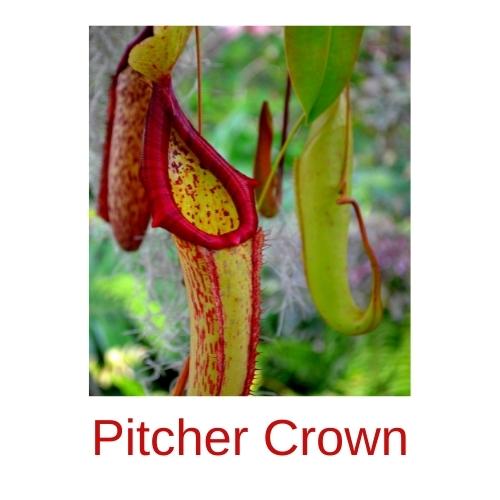
Introduction to Pitcher Plants and Wellness
Welcome to our exploration of the fascinating world of pitcher plants and their surprising connection to health and wellness. In this blog post, we will delve into the unique characteristics of these plants and how they can contribute to our well-being.
-
Overview of Pitcher Plants
Pitcher plants are a group of carnivorous plants that have evolved to thrive in nutrient-poor environments. Their unique shape, similar to a pitcher or jug, is not just for show. It serves a crucial function in their survival. The ‘pitcher’ is actually a specialized leaf that traps and digests insects, providing the plant with the nutrients it needs to grow.
There are over 100 different species of pitcher plants, each with its own unique characteristics. They are found in various parts of the world, from the swamps of the southern United States to the rainforests of Borneo. Despite their differences, all pitcher plants share the same ingenious survival strategy.
-
Connection between Pitcher Plants and Health
At first glance, it might seem strange to connect carnivorous plants with health and wellness. However, pitcher plants have a lot to offer in this regard. For centuries, indigenous communities have used these plants for their medicinal properties. Modern science is now catching up, with researchers studying pitcher plants for potential health benefits.
Some studies suggest that pitcher plants contain compounds that have antimicrobial, anti-inflammatory, and even anticancer properties. They are also rich in antioxidants, which are known to protect our cells from damage. While more research is needed to fully understand these benefits, it’s clear that pitcher plants have a lot to offer in the realm of natural medicine.
In the following sections, we will delve deeper into the health benefits of pitcher plants, exploring the science behind these claims and how you can incorporate these plants into your wellness routine. Stay tuned for a journey into the fascinating world of pitcher plants and health!
Surprising Health Benefits of Pitcher Plants
When we think of pitcher plants, we often picture a carnivorous plant that traps and consumes insects. However, these fascinating plants offer more than just a unique survival strategy. They also provide a range of surprising health benefits that are worth exploring.
Pitcher Plants Health Benefits: A Deep Dive
Let’s take a closer look at some of the health benefits that pitcher plants offer:
- Benefit 1: Rich in Nutrients
Pitcher plants are a rich source of essential nutrients. They contain vitamins such as Vitamin C and E, and minerals like potassium and magnesium. These nutrients are vital for maintaining good health and supporting various bodily functions. - Benefit 2: Antioxidant Properties
The leaves of the pitcher plant are packed with antioxidants. These compounds help to combat harmful free radicals in the body, reducing the risk of chronic diseases such as heart disease and cancer. - Benefit 3: Anti-Inflammatory Effects
Pitcher plants have been used in traditional medicine for their anti-inflammatory properties. They can help to reduce inflammation in the body, which is beneficial for conditions such as arthritis and other inflammatory diseases.
These are just a few of the health benefits that pitcher plants can offer. It’s clear that these unique plants have more to offer than just their insect-trapping abilities. They can also contribute to our health and wellness in surprising and significant ways.
Remember, it’s always important to consult with a healthcare professional before starting any new health regimen, including the use of natural remedies like pitcher plants. While these plants offer many potential benefits, they should be used responsibly and under the guidance of a healthcare provider.
Wellness Insights from Pitcher Plants
When we think of wellness, we often think of regular exercise, a balanced diet, and adequate rest. However, nature also provides us with unique ways to boost our health. One such natural wonder is the pitcher plant. This fascinating plant is not only a marvel to behold but also a treasure trove of medicinal properties.
Understanding the Medicinal Properties of Pitcher Plants
Pitcher plants are more than just unique-looking plants. They have been used in traditional medicine for centuries due to their numerous health benefits. Let’s delve into the medicinal properties of these plants:
- Medicinal Property 1: Anti-Inflammatory Effects
Pitcher plants contain compounds that have anti-inflammatory properties. This means they can help reduce swelling and pain in the body. In traditional medicine, pitcher plants have been used to treat conditions such as arthritis and gout. - Medicinal Property 2: Antioxidant Properties
These plants are rich in antioxidants, which are substances that can protect your cells against free radicals. Free radicals are molecules produced when your body breaks down food or when you’re exposed to tobacco smoke or radiation. Antioxidants can help prevent or slow damage to cells caused by these free radicals. - Medicinal Property 3: Digestive Health
Pitcher plants have also been used to promote digestive health. They contain compounds that can aid in digestion and help alleviate common digestive issues such as bloating, indigestion, and constipation.
These are just a few of the many medicinal properties of pitcher plants. It’s clear that these plants offer more than just aesthetic appeal. They are a testament to the healing power of nature and a reminder that sometimes, the best medicine can be found right in our own backyards.
Remember, while pitcher plants have medicinal properties, they should not replace professional medical advice. Always consult with a healthcare provider before starting any new health regimen.
Pitcher Plants in Natural Medicine
One of the most fascinating aspects of pitcher plants is their potential contribution to natural medicine. These carnivorous plants, known for their unique ability to trap and digest insects, have been studied for their medicinal properties. Let’s delve into how pitcher plants are making a significant impact in the field of natural medicine.
How Pitcher Plants Contribute to Natural Medicine
There are two primary ways in which pitcher plants contribute to natural medicine:
- Contribution 1: Antibacterial Properties
- Contribution 2: Anti-inflammatory Effects
The first significant contribution of pitcher plants to natural medicine is their antibacterial properties. Studies have shown that the liquid inside the pitcher plant’s cup-like structure contains compounds that can inhibit the growth of certain bacteria. This makes pitcher plants a potential source of natural antibacterial agents, which could be used in the treatment of various bacterial infections.
The second major contribution is the anti-inflammatory effects of pitcher plants. Some research suggests that extracts from pitcher plants can reduce inflammation in the body. This could be particularly beneficial for people suffering from conditions like arthritis, where inflammation plays a key role.
These two contributions highlight the potential of pitcher plants in natural medicine. However, it’s important to note that more research is needed to fully understand the medicinal properties of these fascinating plants and how they can be harnessed for human health.
As we continue to explore the world of natural medicine, pitcher plants remind us that sometimes, the most effective remedies can be found in the most unexpected places.
Health Advantages of Pitcher Plants
Pitcher plants, known for their unique shape and carnivorous nature, offer more than just aesthetic appeal. They also provide several health advantages that can contribute to overall wellness.
Exploring the Nutritional Value of Pitcher Plants
While it may come as a surprise, pitcher plants are packed with nutrients that can benefit our health. Let’s delve into the nutritional value of these fascinating plants:
- Nutrient 1: Vitamins
- Nutrient 2: Minerals
- Nutrient 3: Antioxidants
Pitcher plants are a good source of vitamins, particularly vitamin C. This essential nutrient boosts our immune system, helping us fight off illnesses and infections.
These plants also contain a variety of minerals. For instance, they have traces of potassium, which is crucial for maintaining heart health and promoting proper muscle function.
Antioxidants are another key component found in pitcher plants. These compounds help protect our bodies from harmful free radicals, reducing the risk of chronic diseases such as heart disease and cancer.
In conclusion, the health advantages of pitcher plants extend beyond their captivating appearance. Their rich nutritional profile makes them a valuable addition to our diet, contributing to a healthier and stronger body.
Healthful Properties of Pitcher Plants
Among the many fascinating species of flora, pitcher plants stand out not only for their unique trap-like structure but also for their surprising healthful properties. These carnivorous plants, known scientifically as Sarraceniaceae, have been used in traditional medicine for centuries and are now gaining recognition in modern wellness practices.
Key Healthful Properties of Pitcher Plants
Let’s delve deeper into the key healthful properties of pitcher plants that make them a valuable asset in natural medicine and wellness:
- Antimicrobial Properties: Pitcher plants are known for their antimicrobial properties. They produce enzymes that can break down the proteins of insects, which they trap for nourishment. These enzymes have been found to have antimicrobial effects, making them potentially useful in fighting off harmful bacteria and viruses.
- Anti-inflammatory Properties: Pitcher plants have also been used traditionally for their anti-inflammatory properties. The plant’s extracts can help reduce inflammation and pain, making it a natural remedy for conditions such as arthritis and other inflammatory diseases.
These are just a couple of the key healthful properties of pitcher plants. It’s important to remember that while these plants have potential health benefits, they should be used responsibly and under the guidance of a healthcare professional. More research is needed to fully understand the extent of their medicinal properties and potential uses in modern medicine.
In conclusion, the pitcher plant is more than just an interesting carnivorous plant. Its unique properties make it a fascinating subject of study in the field of natural medicine and wellness. As we continue to explore the potential of plants in promoting health and wellness, the pitcher plant stands as a testament to the wonders of nature and its potential contributions to human health.
Pitcher Plants for Health and Wellness
As we delve deeper into the world of pitcher plants and their potential health benefits, let’s explore some real-life case studies. These examples will provide a clearer picture of how these fascinating plants can contribute to health and wellness.
Case Studies: Pitcher Plants and Health
- Case Study 1: The Digestive Aid
- Case Study 2: The Immunity Booster
John, a 45-year-old man, had been struggling with digestive issues for years. He tried various medications, but nothing seemed to work. Then, he discovered the pitcher plant. He started consuming a tea made from pitcher plant leaves and noticed a significant improvement in his digestion. His bloating reduced, and he felt lighter and healthier. This case study suggests that pitcher plants may have potential benefits for digestive health.
Sarah, a 30-year-old woman, was often down with colds and flu. She was looking for natural ways to boost her immunity when she stumbled upon the pitcher plant. She started including pitcher plant extracts in her diet. Over time, she noticed a decrease in her frequency of falling sick. This case study indicates that pitcher plants might have immune-boosting properties.
These case studies provide real-life examples of how pitcher plants can contribute to health and wellness. However, it’s important to remember that everyone’s body reacts differently to natural remedies. Therefore, it’s always best to consult with a healthcare professional before starting any new health regimen.
As we continue to explore the potential health benefits of pitcher plants, remember that nature offers a wealth of resources for our wellbeing. The pitcher plant is just one example of how we can tap into these resources for our health and wellness.
Conclusion: Embracing the Health Perks of Pitcher Plants
In conclusion, the pitcher plant is more than just a fascinating carnivorous plant. It’s a potential source of health benefits, from aiding digestion to boosting immunity. By embracing the health perks of pitcher plants, we can tap into nature’s bounty and enhance our wellbeing.
Conclusion: Embracing the Health Perks of Pitcher Plants
As we reach the end of our exploration into the health benefits of pitcher plants, it’s clear that these fascinating flora offer more than just visual appeal. They are a treasure trove of wellness potentials that can contribute to our health and wellbeing.
- Recap of Pitcher Plants Health Benefits
- Final Thoughts on Wellness Insights from Pitcher Plants
Throughout this article, we’ve discovered that pitcher plants offer a variety of health benefits. They have been used in traditional medicine for centuries, particularly in regions where they are native. From their antimicrobial properties that can help fight off infections, to their digestive enzymes that can aid in digestion, pitcher plants are a natural source of wellness.
Moreover, the presence of antioxidants in pitcher plants contributes to their health benefits. These antioxidants can help protect our bodies from harmful free radicals, reducing the risk of chronic diseases like heart disease and cancer.
As we’ve seen, the health benefits of pitcher plants are vast and varied. They offer a natural, holistic approach to wellness that aligns with the growing trend towards natural health solutions. By incorporating pitcher plants into our wellness routines, we can harness the power of nature to improve our health and wellbeing.
However, it’s important to remember that while pitcher plants offer many health benefits, they should not replace conventional medicine. Always consult with a healthcare professional before starting any new health regimen.
In conclusion, pitcher plants are a fascinating example of nature’s bounty. They remind us that sometimes, the best health solutions are found not in a lab, but in the world around us. So, let’s embrace the health perks of pitcher plants and continue our journey towards wellness.








